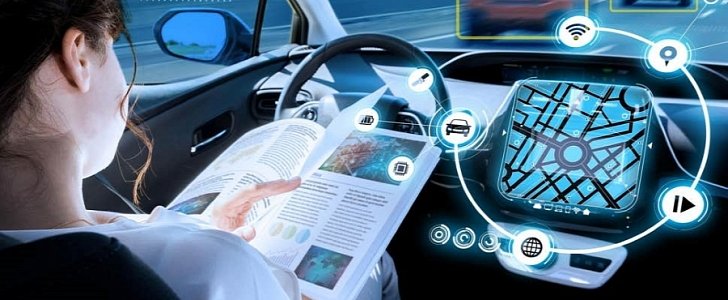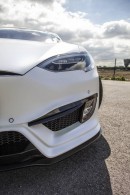Driverless cars could spell the end of a solid driving skill set. A recent study from the University of Nottingham reveals that drivers tend to rely a bit too much on automated driving, so when they’re forced to take back control, they're pretty much out of the loop.
The research looked at 49 drivers of different ages and genders, driving a simulator for half an hour each day, for 5 consecutive days. Overall, driving improved throughout the week. But at the same time, drivers became more complacent in autonomous mode, and when they switched back to manual driving they were faced with slow response times, poor decisions and errors.
On the first day of the study, drivers were told they would start in manual mode and then switch to autonomous, once they reached a dual motorway. They also received a warning that they would get a 60-second heads-up to turn back to manual. On that first day, when they took back control of the car, they went off course on an average of 2 meters, varied speeds and swerved across lanes.
Even on the last day, they still had slow response times when they took back control of the car and showed a greater inclination to become complacent when in driverless mode. Specifically, most of them would read, do their makeup or sleep while the car drove itself, which meant they needed precious seconds to get back in action in case of an emergency.
In a real life scenario, those few seconds could mean the difference between life and death.
“A major concern is that drivers are likely to have become ‘out-of-the-loop,’ i.e. they have not been required to actively monitor, make decisions about or provide physical inputs to the driving task,” researchers Professor Gary Burnett, Dr. David Large and Dr. Davide Salanitri write in the paper.
“This reduces their perception and comprehension of elements and events in their environment, and their ability to project the future status of these things – their so-called situational awareness.”
In the findings of the study, RAC Foundation director Steve Gooding sees the biggest challenge of bringing driverless cars on the public roads.
“If conditionally automated vehicles are to be allowed on to the public road then their designers are going to have to apply their minds to the circumstances where drivers will be invited – or required – to retake control,” Gooding says in a statement for Nottingham Post. “
The very real likelihood that, at best, those drivers will need plenty of warning to set down their papers or close their laptop computer and, at worst, still more time to wake from slumber.”
On the first day of the study, drivers were told they would start in manual mode and then switch to autonomous, once they reached a dual motorway. They also received a warning that they would get a 60-second heads-up to turn back to manual. On that first day, when they took back control of the car, they went off course on an average of 2 meters, varied speeds and swerved across lanes.
Even on the last day, they still had slow response times when they took back control of the car and showed a greater inclination to become complacent when in driverless mode. Specifically, most of them would read, do their makeup or sleep while the car drove itself, which meant they needed precious seconds to get back in action in case of an emergency.
In a real life scenario, those few seconds could mean the difference between life and death.
“A major concern is that drivers are likely to have become ‘out-of-the-loop,’ i.e. they have not been required to actively monitor, make decisions about or provide physical inputs to the driving task,” researchers Professor Gary Burnett, Dr. David Large and Dr. Davide Salanitri write in the paper.
“This reduces their perception and comprehension of elements and events in their environment, and their ability to project the future status of these things – their so-called situational awareness.”
In the findings of the study, RAC Foundation director Steve Gooding sees the biggest challenge of bringing driverless cars on the public roads.
“If conditionally automated vehicles are to be allowed on to the public road then their designers are going to have to apply their minds to the circumstances where drivers will be invited – or required – to retake control,” Gooding says in a statement for Nottingham Post. “
The very real likelihood that, at best, those drivers will need plenty of warning to set down their papers or close their laptop computer and, at worst, still more time to wake from slumber.”















